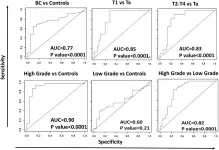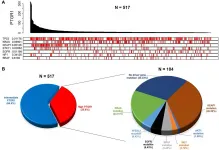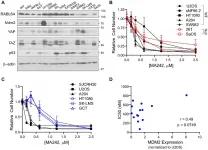(Press-News.org) LEBANON, NH - By 2030, pancreatic ductal adenocarcinoma (PDAC), the most lethal form of pancreatic cancer, is projected to become the second leading cause of cancer-related deaths in the United States. Not only are therapeutic options limited, but nearly half of all PDAC patients who have their tumors removed surgically experience disease recurrence within a year, despite receiving additional chemotherapy. For more advanced stages, only about one-third of patients have a limited response to approved chemotherapy.
A team of researchers led by Dartmouth and Dartmouth-Hitchcock's Norris Cotton Cancer Center (NCCC) Director Steven D. Leach, MD, and Surajit Dhara, PhD, Senior Research Scientist in the Leach laboratory, in collaboration with colleagues at Memorial Sloan Kettering Cancer Center and Weill Cornell Medicine, are developing the first prognostic and therapeutic epigenetic biomarker for PDAC patients.
Their discoveries will help predict which patients are likely or not likely to benefit from traditional chemotherapy. The likely "responder" patients can be confidently treated with traditional chemotherapy regimens, while the likely "non-responder" patients can be given an alternate regimen--potentially a combination of epigenetic therapy. The technology addresses a pressing clinical need by introducing the first ever epigenetic precision medicine approach to pancreatic cancer, as a means toward better outcomes and quality of life for all patients.
Epigenetic therapy can reactivate expression of the regulatory genes that have been silenced in chemo-resistant tumors and therefore make the tumors responsive to chemotherapy.
The team's work, entitled "Pancreatic cancer prognosis is predicted by an ATAC-array technology for assessing chromatin accessibility," is newly published in Nature Communications.
"We have a discovery and an invention emanating from this work," says Dhara. "By investigating all epigenetic elements that regulate genes in PDAC, we discovered that only about 1,092 elements are associated with chemotherapy resistance and early recurrence of this disease. Of those, 723 elements are silenced in chemo-resistant tumors, and are optimally predictive."
To translate this knowledge into the clinic, Leach and Dhara invented a novel technology platform called "ATAC-array" that assesses gene regulatory elements as a means to predict chemotherapy response and the potential benefit of epigenetic therapy in patients with PDAC. The technology is DNA-based and can potentially be performed on fine-needle aspiration specimens collected from tumors at the time of diagnosis.
Although there are nine FDA-approved epigenetic drugs, and more in the pharma pipeline, a fundamental means of distinguishing tumors that would benefit from epigenetic reprogramming therapy is still lacking. "We currently appear to be at the dawn of a new era in which epigenetic reprogramming is poised to become increasingly relied upon to optimize therapeutic effectiveness in multiple tumor types," says Leach. "With this work, we have pioneered a precision epigenetic approach in PDAC, a treatment approach that is now ready to be translated into the clinic."
Leach and Dhara have co-founded Episteme Prognostics, Inc.-- a precision medicine company developing therapeutic biomarkers for pancreatic cancer--in order to translate this work directly to the clinic as rapidly as possible.
INFORMATION:
Senior corresponding author, Steven D. Leach, MD, is the director of Dartmouth's and Dartmouth-Hitchcock's Norris Cotton Cancer Center (NCCC), Member of the NCCC Cancer Biology and Therapeutics Research Program, the Preston T. and Virginia R. Kelsey Distinguished Chair in Cancer, and Professor of Molecular and Systems Biology and of Surgery at the Geisel School of Medicine at Dartmouth. Dr. Leach's laboratory has a long track record of research productivity in the field of pancreatic cancer biology and is known for establishing important links between pancreatic development and pancreatic cancer using both mouse and zebrafish model systems.
Co-Lead author, Surajit Dhara, PhD, is Senior Research Scientist at Dartmouth's and Dartmouth-Hitchcock's Norris Cotton Cancer Center (NCCC). Before joining NCCC, he led strategy development in clinical biomarker discovery at Memorial Sloan Kettering Cancer Center (MSK), bringing expertise in clinical biomarker discovery and precision oncology to NCCC. Dr. Dhara is lead inventor of the ATAC-array technology.
About Norris Cotton Cancer Center
Norris Cotton Cancer Center, located on the campus of Dartmouth-Hitchcock Medical Center (DHMC) in Lebanon, NH, combines advanced cancer research at Dartmouth College's Geisel School of Medicine in Hanover, NH with the highest level of high-quality, innovative, personalized, and compassionate patient-centered cancer care at DHMC, as well as at regional, multi-disciplinary locations and partner hospitals throughout NH and VT. NCCC is one of only 51 centers nationwide to earn the National Cancer Institute's prestigious "Comprehensive Cancer Center" designation, the result of an outstanding collaboration between DHMC, New Hampshire's only academic medical center, and Dartmouth College. Now entering its fifth decade, NCCC remains committed to excellence, outreach and education, and strives to prevent and cure cancer, enhance survivorship and to promote cancer health equity through its pioneering interdisciplinary research. Each year the NCCC schedules 61,000 appointments seeing nearly 4,000 newly diagnosed patients, and currently offers its patients more than 100 active clinical trials.
About Dartmouth-Hitchcock Health
Dartmouth-Hitchcock Health (D-HH), New Hampshire's only academic health system and the state's largest private employer, serves a population of 1.9 million across northern New England. D-H provides access to more than 2,000 providers in almost every area of medicine, delivering care at its flagship hospital, Dartmouth-Hitchcock Medical Center (DHMC) in Lebanon, NH. DHMC was named again in 2020 as the #1 hospital in New Hampshire by U.S. News & World Report, and recognized for high performance in 9 clinical specialties and procedures. Dartmouth-Hitchcock also includes the Norris Cotton Cancer Center, one of only 51 NCI-designated Comprehensive Cancer Centers in the nation; the Children's Hospital at Dartmouth-Hitchcock, the state's only children's hospital; affiliated member hospitals in Lebanon, Keene, and New London, NH, and Windsor, VT, and Visiting Nurse and Hospice for Vermont and New Hampshire; and 24 Dartmouth-Hitchcock clinics that provide ambulatory services across New Hampshire and Vermont. The D-H system trains nearly 400 residents and fellows annually, and performs world-class research, in partnership with the Geisel School of Medicine at Dartmouth and the White River Junction VA Medical Center in White River Junction, VT.
Within the European Union alone, about three million people are affected by an autism spectrum disorder (ASD). Some are only mildly affected and can live independent lives. Others have severe disabilities. What the different forms have in common is difficulty with social interaction and communication, as well as repetitive-stereotypic behaviors. Mutations in a few hundred genes are associated with ASD. One of them is called Cullin 3, and it is a high-risk gene: A mutation of this gene almost certainly leads to a disorder. But how exactly does this gene affect the brain? To learn more about it, Jasmin Morandell and Lena Schwarz, PhD students at Professor Gaia Novarino's research group, ...
SILVER SPRING, Md.--People who are successful at weight-loss maintenance spend less time sitting during the week and weekends compared to weight-stable individuals with obesity, according to a paper published online in Obesity, The Obesity Society's flagship journal. This is the first study to examine time spent in various sitting activities among weight-loss maintainers.
Prior findings from 2006 in the National Weight Control Registry indicated that weight-loss maintainers watched significantly less television than controls, but other sitting activities were not examined. In the current study, weight-loss maintainers did not significantly differ from controls in reported weekly sitting time ...
SILVER SPRING, Md.-- Multi-factorial metabolic and inflammatory abnormalities in obesity, independently or in combination, seems to be the critical biological link of obesity, cancer and racial/gender health disparities. However, the specific cross-talk between these factors remain elusive. Because of the extraordinary relevance in understanding the relationship between obesity-associated inflammation and comorbidities with cancer development, progression and intervention, three new papers emphasizing different aspects of the obesity and cancer connection can be found in the latest online issue of Obesity, ...
A study of 1,095 patients hospitalized with COVID-19 discovered that two easily measurable signs of health - respiration rate and blood-oxygen saturation - are distinctly predictive of higher mortality. Notably, the authors said, anyone who receives a positive COVID-19 screening test can easily monitor for these two signs at home.
This context is lacking in current guidance from the Centers for Disease Control and Prevention, which tells people with COVID-19 to seek medical attention when they experience overt symptoms such as "trouble breathing" and "persistent pain or pressure in the chest" - indications that may be absent even when respiration and blood oxygen have reached dangerous levels, the authors ...
New research indicates that certain anti-cancer therapies may hasten cellular aging, where changes in the DNA of patients may contribute to greater inflammation and fatigue. The findings are published by Wiley early online in CANCER, a peer-reviewed journal of the American Cancer Society.
Gene activity is often adjusted during life through epigenetic changes, or physical modifications to DNA that do not involve altering the underlying DNA sequence. Some individuals may experience epigenetic age acceleration (EAA) that puts them at a higher risk of age-related ...
Oncotarget published "Urine protein biomarkers of bladder cancer arising from 16-plex antibody-based screens" which reported that the current study examines urine samples from 66 subjects, comprising of 31 Urology clinic controls and 35 bladder cancer patients, using a Luminex based screening platform.
ELISA validation was carried out for the top 4 prospective urine biomarkers using an independent cohort of 20 Urology clinic controls and 60 bladder cancer subjects.
Eight of these urine proteins were able to differentiate BC from control urine with ROC AUC values exceeding 0.70 at p < 0.0001, with specificity values exceeding 0.9. Upon ELISA validation, urine IL-1α, IL-1ra, and IL-8 were able to distinguish ...
Oncotarget published "The acylfulvene alkylating agent, LP-184, retains nanomolar potency in non-small cell lung cancer carrying otherwise therapy-refractory mutations" which reported that KEAP1 mutant NSCLCs further activate NRF2 and upregulate its client PTGR1. LP-184, a novel alkylating agent belonging to the acylfulvene class is a prodrug dependent upon PTGR1.
The authors hypothesized that NSCLC with KEAP1 mutations would continue to remain sensitive to LP-184. LP-184 demonstrated highly potent anticancer activity both in primary NSCLC cell lines and in those originating from brain metastases of primary lung cancers.
LP-184 activity correlated with PTGR1 transcript levels but was independent of mutations in key oncogenes and tumor ...
Oncotarget published "Prognostic and therapeutic value of the Hippo pathway, RABL6A, and p53-MDM2 axes in sarcomas" which reported that herein the authors evaluate expression of TAZ and YAP, the p53-MDM2 axis, and RABL6A, a novel oncoprotein with potential ties to both pathways, in sarcomas of different histological types.
Immunohistochemical staining of a tissue microarray including 163 sarcomas and correlation with clinical data showed that elevated YAP and TAZ independently predict worse overall and progression-free survival, respectively.
In the absence of p53 expression, combined TAZ and YAP expression adversely affect overall, progression free, and metastasis free survival ...
Regular consumption of milk is not associated with increased levels of cholesterol, according to new research.
A study published in the International Journal of Obesity looked at three large population studies and found that people who regularly drank high amounts of milk had lower levels of both good and bad cholesterol, although their BMI levels were higher than non-milk drinkers. Further analysis of other large studies also suggests that those who regularly consumed milk had a 14% lower risk of coronary heart disease.
The team of researchers took a genetic approach to milk consumption by looking at a variation in the lactase gene associated with digestion of milk sugars known as lactose.
The study identified that having the genetic variation where people can digest ...
Press release - Abstract 1394: Alterations in clock genes expression in Eutopic and Ectopic Endometrial Tissue
New research suggests that night shift work is linked to menstrual irregularity and increased chance of developing endometriosis
According to a study being presented at the 23rd European Congress of Endocrinology (e-ECE 2021), on Sunday 23 May at 19:00 CET (http://www.ece2021.org), women working night shifts may be at a greater risk of menstrual irregularity and developing endometriosis. The research found a reduction in the expression of PER-2, CRY-1 and CLOCK genes along with an increase in REV-ERBb in ectopic compared to ...




